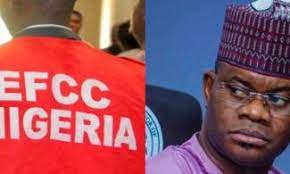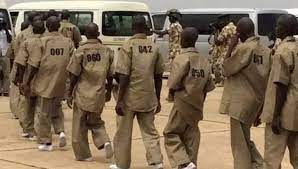The headline was a shock: “North will shock South in 2023 over presidency – Tony Momoh.”As the Hausa man would say, haba.
We thought the rotation of the presidency between the north and the south was cast in stone and the vice-president, Professor Yemi Osinbajo, would not even need to stretch his hands to receive the baton from President Buhari in 2023. Apparently not. Momoh said: “We have the South-West, South-East and South-South. We even have the north. That the presidency is in the north now does not imply that the north will not be interested in the presidency in 2023.”
The prince, if I may borrow a reporter’s favourite label, is a chieftaincy of the ruling APC. He did not claim to speak for his party. But we know that when a party chieftain gives personal views on a matter such as this, its weight could threaten to shatter some plans and illusions. Take Momoh seriously on two accounts – as a prince and as an APC chieftain. He is a distinguished former newspaper editor who does not indulge in sensationalism. His statement must have sent the politicians scrambling into the covens to re-work their political mathematics per the 2023 presidential election.
I took immediate interest in the former information minister’s statement for a different reason. I think Momoh threw up a fundamental issue: the illusion of power rotation between the north and the south. It is one of our unfinished businesses that have reduced our movement to motion, haunt us and make it difficult for us to have that essential thing that unites and motivates individuals and nations – the Nigerian dream. Nigerian nightmare is more like it now.
Let me deal here with one instance of the many unfinished businesses: rotational presidency. The locus of political power in the country became contentious even before our independence in 1960. It has remained more so today because, polarised as we are along the ethnic fault line, we still see a Nigerian president as essentially an ethnic champion having his tribal time and dance on the national stage. The clamour for it is our turn next derives from our ignorance about the true position of rotational presidency as a settled political matter.
Certain provisions in our constitutions, first made formal in the 1979 constitution, were aimed at making a Nigerian president a Nigerian president and thus owned by all Nigerians. The constitution provides that a Nigerian president must win at least 25 per cent of the votes cast in at least two-thirds of the states. Neither the north nor the south contains two-thirds of the 36 states. With his nation-wide vote spread between the north and the south, the elected president is owned by and beholden to all Nigerians. Chalk that up as the sweet and sour taste of political theory. It is a topic for another column, trust me.
The NPN first mooted the idea of a rotational presidency between the north and the south in the second republic. Sadly, the government it brought into office did not survive long enough to test the sincerity of the party in 1987. The generals came back. Still, the idea of a rotational presidency resonates with all of us because it always seems like a sensible response to this problem of the locus of political power. To be sure, it was never intended to divest a Nigerian president of his ethnic garb but to give both the north and the south a chance at intervals of our national elections to produce the man who holds the cow while his own people milk it. It should make for a happy nation, all things being equal. It does not, because all things are not equal.
It has remained an unfinished business because it is absent in the constitution. Instead, it has been left to the discretion of the political parties. Consequently, according to Momoh, this being a democracy that guarantees all citizens the right to seek the highest political office, neither the north nor the south can legitimately claim that it is its turn at any point in time. “Even when we zoned the presidency to a particular region,” he underlined his point, “some people still got up and contested because they have the constitutional right to do so.”
We tend to take it for granted that rotational presidency is a constitutional imperative. It is not. It is an unfinished business the political parties use it to tease but cannot effect its forward movement. Rotational governorship in the states derived its place from this but it too is an unfinished business. And like in the centre, it too raises and dashes hope, making politics also a war by another means.
Let us approach the resolution of this matter this way. Nigeria is divided into six geo-political zones and the states into three senatorial districts. These should make presidential and governorship rotation among the zones and the senatorial districts both possible and easy to implement. The problem is not that we and our leaders are ignorant of this unfinished business. Our situation reminds me of what happened when rats convened a council of rats to get volunteers to bell the cat.
Finding no volunteers to undertake the mission, the council concluded that it was too hazardous an undertaking. It was left to each rat to pray not to attract the attention of a hungry cat. I suppose the same wisdom is at the root of our unfinished businesses. Shaking up the system with a constitutional imprimatur is not a task a Nigerian leader would be willing to under take. It carries personal and ethnic risks. The generals went so but not far enough. They knew were to stop.
Still, try as we may as a nation, it would be asking too much to think that we can live in peace with individuals and groups and tribes interpreting our legions of unfinished businesses as it suits them and heating the system with impassioned arguments that only deepen our collective frustration and make forlorn expectations even more forlorn. Expect the progressive downgrading of our elections into an ethnic warfare at all levels to get worse.
We have only one option open to us – finish this unfinished business with constitutional amendments that give legal effect to the rotation of the presidency and the governorship. I offer you my suggestions. First, make the six-geo-political zones and the senatorial districts constitutional basis for sharing political offices. Two, on that basis, rotate the presidency among these six zones numbered A,B,C,D,E,F.
This would cure the vagueness of the informal north-south rotation that only inflames passion but is unimplementable with any degree of consistency or commitment. All the parties must field presidential candidates from the zone whose turn it is to produce the president. The vice-president must be chosen from the zone not slated to produce the succeeding president. This should create a level playing field. This arrangement may be reviewed after each zone has produced a president. I am sure that by that time Nigerians would have matured enough to elect Nigerian presidents. My generation expects to receive progress reports in their choice mansions in heaven, believe me.
Three, this formula should be applied to the states. The governorship must rotate among the three senatorial zones in each state. This should end the assumed right of former minorities now lucky to be majorities in their states to hold power in perpetuity. It is no way to build the country and unite the people. When these positions become constitutional rights duly enforced and protected by the Nigerian state, the right to rule would no longer be seen as a favour bestowed on some by others.
We should think less of power and more of how we must use the locus of power to build and unite a nation in which people are not denied their due constitutional rights as citizens, no matter how small they might be numerically. We are where we are because we are burdened by the plethora of unfinished political, economic and social businesses. No country with its feet tied firmly to this millstone can run the Olympic race of economic, social and political development successfully. This generation of our leaders must find the courage and the will to commit to a less fractious and polarised nation. Our national fault lines are the consequences of a feeling of unfairness, injustice and marginalisation that distance people from holding the levers of political power at all levels of government. Those levers matter.
Email:[email protected]
SMS: 0805500191



